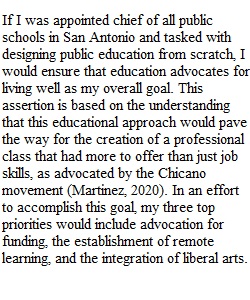


Q Is education the solution to poverty? I wish I knew. In this discussion, we're going to take on some knotty issues. You'll imagine yourself in charge of public education for San Antonio, and you'll outline your priorities. But first, some background. Background: "Living Well" or Job Skills? A portrait bust of the ancient Greek philosopher Aristotle, who lived in the fourth century BCE Should public schools teach students to live well, or should they stick with job skills? • Listen to this 11-minute audio segment from the BBC -- it looks back to the ancient Greeks and argues that teaching how to live well is one of the most important goals for school. (The part about school begins at about 8:00 and goes to the end.) • Optional: on the other side of this question, read or skim about the initiative of businessman Randy Best (Links to an external site.) to provide low-cost, online training in job skills, which he describes as a "college education." Background: W.E.B. Du Bois debates Booker T. Washington W.E.B. Du Bois (1868 - 1963), the author of The Souls of Black Folk -- Du Bois believed that liberal arts furnished the best education for African Americans in segregated America of the early 20th century Booker T. Washington (1856 - 1915), the founder of the Tuskegee Institute -- Washington believed that industrial arts (i.e. job skills) furnished the best education. Here's a different but related issue -- the debate between two prominent Americans of the early 20th century, W.E.B. Du Bois and Booker T. Washington, about the best kind of education for African Americans in segregated, "Jim Crow" America. In a nutshell, Du Bois favored liberal arts, whereas Washington favored industrial arts. Both men saw education as a means of empowerment in a deeply unjust society. Here are two good sources about the debate: • History of Black Education: Washington and DuBois (Links to an external site.) (Kenyon.edu) • Booker T. Washington and W. E. B. DuBois: The Problem of Negro Leadership (Links to an external site.) (Yale.edu) Important note about terminology: in the historical sources linked above, you will see terminology that dates to an earlier age and is considered offensive today. Since we are educated people, living and writing in the early 21st century, please use current terminology appropriate for educated discourse, such as "Black" or "African American." For further thoughts on these terms, see here (Links to an external site.) (from KARE11.com, a TV station in Minnesota). Background: Poverty and San Antonio This is just a picture of downtown San Antonio, because pictures help to make the page more readable. You already know what San Antonio looks like! San Antonio is now ranked as the poorest big city in the nation. It also lags in educational attainment, as measured by college degrees per capita. • San Antonio Poverty Rate Tops List Of Large Metro Areas (Links to an external site.) (TPR.org; Sept. 26, 2019) • Census Data: San Antonio Region’s Poverty Rate Rises, Tops Nation (Links to an external site.) (TheRivardReport.com; Sept. 26, 2019) (According to this article (Links to an external site.) (Forbes.com, 2014), San Antonio is attracting educated workers at a rapid clip. Of course, an influx of educated workers doesn't change the education level of people already here.) Related podcast about education in the Chicano movement If you're interested, here's another resource — from Los Angeles, not San Antonio — but perhaps still useful on the subject of education. • "LISTEN: A Conversation About Where The Chicano Movement Is Today (Links to an external site.)" from LAist.com • You have to scroll down a little. This podcast is NOT the top item on this page. • There is also a transcript. • Look / listen in particular for the discussion of education. Your priorities -- writing instructions Now that we have considered the issues and set the stage, here's the problem: suppose YOU are appointed chief of all public schools in San Antonio, and it is your job to design public education from scratch. • What is your overall goal or vision for public education -- that is, what kind of education would you want the students of San Antonio to have? • What are your top three priorities for accomplishing this goal or realizing this vision? • Write a bit to explain each priority, and write a bit to explain how each priority contributes to your overall goal or vision. • Make specific references to at least two of the following -- whether you are endorsing them or opposing them: the BBC audio segment about the purpose of school; the ideas of W.E.B. Du Bois; the ideas of Booker T. Washington; the podcast about education in the Chicano movement. After you post, reply to TWO classmates and point out something insightful you find in each classmate's post. Write enough to carry the conversation forward and build on the classmate's ideas -- at least 100 words. Checklist • As always in this class, write more than one paragraph. • Write enough to develop your points. • Recognize that this is a complex question that requires nuance and acceptance of ambiguity, and resists black-and-white solutions. • Make sure to make substantial references to (some of) the materials provided above. Make sure it's clear you've digested the issues. • As discussed in the "important note" above, please use current terminology that is appropriate for educated discourse in the 21st century. • You won't get a worse grade if you exclude humanities from your priorities, and you won't get a better if you include it. I'm looking for real depth of analysis, and careful consideration of the ideas, not "lip service" to the field I happen to teach.
View Related Questions